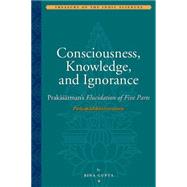
| Publisher's Note | p. xi |
| Series Editor's Preface | p. xiii |
| Author's Preface | p. xv |
| Abbreviations & Sigla | p. xviii |
| Introduction | |
| Introduction | p. 3 |
| Historical Context and Substance of the PPV | p. 4 |
| Consciousness, Knowledge, and Ignorance | p. 10 |
| Basic Metaphysical and Epistemological Advaita Concepts and Principles | p. 23 |
| Brahman | p. 23 |
| Levels of Being | p. 34 |
| The Brahman and the World | p. 39 |
| Adhyasa | p. 41 |
| Maya or Avidya | p. 46 |
| How is Avidyä known? | p. 67 |
| The Locus and the Object of Avidya | p. 77 |
| Avidya: One or Many? | p. 82 |
| The Brahman and the Jiva | p. 87 |
| Pratibimbavada (the reflection theory) | p. 88 |
| Abhasavada (the semblance theory) | p. 89 |
| Avacchedavada (the limitation theory) | p. 90 |
| The Path to Moksa | p. 91 |
| The PPV and the Western Tradition | p. 106 |
| Transliterated Text, Translation, and Critical Explanatory Notes | |
| Mangalacarana | p. 123 |
| The Object and the Purpose of the Commentary | p. 129 |
| What is Removed by Knowledge is Not a Real Entity | p. 142 |
| Darkness is Positive | p. 153 |
| Ignorance as the Material Cause of Superimposition | p. 156 |
| Perception Establishes that Ignorance is Positive | p. 168 |
| Inference Also Establishes that Ignorance is Positive | p. 172 |
| Postulation Also Establishes that Ignorance is Positive | p. 173 |
| Establishment of the Thesis that Ignorance Does Not Conceal Not-Self; There is No Need of it | p. 175 |
| Establishment of the Thesis that Ignorance is One, Not Many; Concealment of the Self by Ignorance | p. 179 |
| The Refutation of the Bhaskara View | p. 184 |
| Immediate Apprehension of Silver in an Erroneous Cognition (Exposition of Akhyati) | p. 203 |
| What is an Erroneous Cognition? Refutation of Akhyati | p. 210 |
| Refutation of the Buddhist Theory of the Relation Between Words and Their Meanings; Determination of atmakhyati | p. 217 |
| Two Mental Modifications (Vrttis) in an Erroneous Cognition; One Reality and the Levels of Existence | p. 230 |
| Non-Difference of Ma ya and Avidya | p. 239 |
| Consideration of Cancellation (Badha) | p. 245 |
| Establishment of the Self-Luminosity of the Self | p. 268 |
| Establishment of the Thesis that Self-Luminous Consciousness is the Locus of the Self, Which Does Not Contradict the Identity of the Brahman and the Jiva | p. 275 |
| Establishment of the Thesis that Ignorance is the Material Cause of the Distinction Between the Brahman and the Jiva and the Relation Between Avidya and Consciousness | p. 279 |
| Establishment of the Thesis that Consciousness is the Locus of Ignorance, not the Inner Sense | p. 283 |
| Consciousness as the Object of Ignorance | p. 287 |
| Refutation of the Samkhya View of the Self and Determination of the View that the "I" Denotes the Self | p. 295 |
| The Inner Sense is Different from the Self; the Self is Self-Luminous | p. 309 |
| Exposition of the Conclusive View Regarding the "I"-Sense | p. 313 |
| Not Counted | |
| Ignorance is a Positive Entity Rather than the Absence of Knowledge | p. 321 |
| "I" is not Pure Self; the Status of Life (Prana) | p. 327 |
| Existence of the Inner Sense: Objections by the Opponents | p. 330 |
| Ignorance is the Cause of the Distinction Between the Original and its Reflection | p. 347 |
| The Reflection Theory is Better than the Limitation Theory | p. 352 |
| Ignorance, Inner Sense, Gross Body, and the Jiva; Distinction Between the Jiva and the Brahman in Deep Sleep; the Objections Against the Position that it is a Reflection and the Resolution | p. 355 |
| Determination of Pratikramavyavastha, Possible Objections, Alternatives, and Resolutions | p. 363 |
| Vijñanavada vs. Advaita Vedanta | p. 379 |
| Pratyabhijña | p. 388 |
| Establishment of the Momentariness of the Vijñana Inferentially | p. 395 |
| Refutation of the Position that the Space is Visible and Inferable | p. 423 |
| Establishment of the Thesis that the Inner Sense is Known by the Saksin | p. 446 |
| The Purpose of the Vedantic Texts | p. 453 |
| Brahman? Inclusive or Exclusive of the World? | p. 460 |
| Whether Truth and Falsity of Cognitions Intrinsic or Extrinsic? | p. 468 |
| sabda and Immediate Knowledge | p. 480 |
| Determination of the Thesis that Reflection and Contemplation are Subservient to Hearing | p. 484 |
| Jivan Mukti | p. 488 |
| The Purpose of Vidhi and the Beginning of the Inquiry into the Vedantic Texts | p. 491 |
| Bibliography | p. 501 |
| Index | p. 511 |
| Table of Contents provided by Ingram. All Rights Reserved. |
The New copy of this book will include any supplemental materials advertised. Please check the title of the book to determine if it should include any access cards, study guides, lab manuals, CDs, etc.
The Used, Rental and eBook copies of this book are not guaranteed to include any supplemental materials. Typically, only the book itself is included. This is true even if the title states it includes any access cards, study guides, lab manuals, CDs, etc.